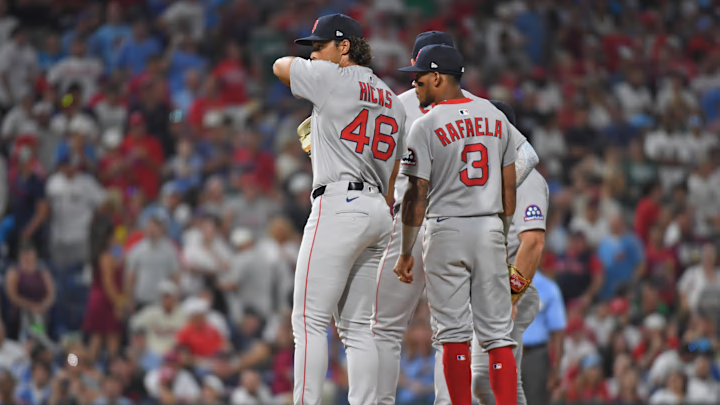In the wake of the Boston Red Sox' 3-2 loss to the Philadelphia Phillies on Monday night, all anybody in New England wanted to talk about was the way it ended. And understandably so: It's not every day you see a game decided in extra innings by a walk-off catcher's interference, especially not when that catcher's interference comes on a check swing. Heck, it looked like Edmundo Sosa was going more for Carlos Narvaez's glove than the ball.
The Phillies walk it off on a ... catcher's interference 👀 pic.twitter.com/g5yYQH92zL
— MLB (@MLB) July 22, 2025
You can forgive Boston for feeling like they had the outcome of the game taken out of their hands a bit. That's only part of the truth, though. Even if Sosa hadn't made contact with Narvaez, even if the pitch had been called a ball and the at-bat had continued, it's still more than likely that the Red Sox would've wound up losing — Philadelphia had the bases loaded and nobody out in the inning, needing to push just one run across to walk off with a win.
And that, more than anything to do with the rulebook, is what Boston and its fans should really be focused on. Because the real reason they lost doesn't have anything to do with umpires or replay review; it has to do with a bullpen that is still at least one pitcher too short, and a trade that continues to look more confusing by the day.
For more news and rumors, check out MLB Insider Robert Murray’s work on The Baseball Insiders podcast, subscribe to The Moonshot, our weekly MLB newsletter, and join the discord to get the inside scoop during the MLB season.
Jordan Hicks isn't a high-leverage reliever, and that's a problem for Boston
Since coming over as part of the Rafael Devers trade last month, the Red Sox have gotten the full Jordan Hicks experience. The stuff remains electric, with a sinker that can get up toward the triple digits at times. But it doesn't miss as many bats as you'd think, and more importantly, the command remains a serious issue — one that prevents Hicks from being the sort of reliever that a team can trust in high-leverage spots.
Cora tried the righty in one such spot on Monday, asking him to start the bottom of the 10th with the game tied at 2. Hicks promptly walked Otto Kemp on four pitches, then started Max Kepler off with a wild pitch that allowed both runners to advance. That forced Cora to have Hicks intentionally walk Kepler to load the bases, setting up Sosa's game-ending interference call.
It's one thing to not be able to preserve a tie in our brave new ghost-runner world; it's another to not even be competitive. The Phillies didn't have to win this game, they simply had to sit back and let Hicks hand it to them. That cannot happen for a team that has legitimate postseason aspirations like the Red Sox do, and in a perfect world Boston wouldn't have to place so much trust in a pitcher who's liable to lose the strike zone at any given moment (he now has 24 walks in 53.1 innings this season).
Unfortunately, the Sox don't live in that world. Instead, they live in a world in which Aroldis Chapman and Garrett Whitlock are really the only two relievers Cora has reason to trust in the later innings, with Greg Weissert sometimes in that circle of trust depending on the day. That's not enough to get you to the postseason, much less to get you to the World Series.
Granted, getting healthy will help some, as Justin Slaten has resumed a throwing program and should hopefully come back from his shoulder injury at some point before the end of the year. But if Monday showed us anything, it's that the Red Sox can't afford to let this deadline pass without not just one but ideally multiple bullpen additions, because this team is in desperate need of late-inning reliability.
